- Home
- Holly Black
The Queen of Nothing (The Folk of the Air #3)
The Queen of Nothing (The Folk of the Air #3) Read online
Contents
Title Page
Praise for THE FOLK OF THE AIR series
The Folk of the Air series
Dedication
Map
Book One
Prologue
Chapter 1
Chapter 2
Chapter 3
Chapter 4
Chapter 5
Chapter 6
Chapter 7
Chapter 8
Chapter 9
Chapter 10
Chapter 11
Chapter 12
Chapter 13
Chapter 14
Chapter 15
Chapter 16
Book Two
Chapter 17
Chapter 18
Chapter 19
Chapter 20
Chapter 21
Chapter 22
Chapter 23
Chapter 24
Chapter 25
Chapter 26
Chapter 27
Epilogue
Acknowledgements
Copyright
Praise for THE FOLK OF THE AIR series
‘Brilliantly enjoyable … Definitely Holly Black’s best so far.’
Amanda Craig
‘An enticing world that’s as sinister as it is appealing … Shadowhunters fans should read this at their earliest opportunity.’
SciFi Now magazine
‘A veritable queen of dark fantasy, Holly Black spins a thrilling tale of intrigue and magic … Unmissable for fans of Sarah J. Mass and the Grisha trilogy.’
Buzzfeed UK
‘Whatever a reader is looking for – heart-in-throat action, deadly romance, double-crossing, moral complexity – this is one heck of a ride.’
Booklist
‘Complex, nuanced characters, frank sensuality and thorn-sharp, intricate storytelling all conspire to ensnare.’
Guardian
‘Lush, dangerous, a dark jewel of a book … This delicious story will seduce you and leave you desperate for just one more page.’
Leigh Bardugo, No. 1 New York Times bestselling author of Six of Crows and Crooked Kingdom
‘Holly Black is the Faerie Queen.’
Victoria Aveyard
‘A lush, immersive experience … where little is what it seems.’
Books for Keeps
‘This tale of a kingdom and deadly power struggles as seen through human eyes is an absolute must-read.’
Irish Independent
The Folk of the Air series
The Cruel Prince
The Wicked King
The Queen of Nothing
For Leigh Bardugo,
who never lets me get away with anything
The Royal Astrologer, Baphen, squinted at the star chart and tried not to flinch when it seemed sure the youngest prince of Elfhame was about to be dropped on his royal head.
A week after Prince Cardan’s birth and he was finally being presented to the High King. The previous five heirs had been seen immediately, still squalling in ruddy newness, but Lady Asha had barred the High King from visiting before she felt herself suitably restored from childbed.
The baby was thin and wizened, silent, staring at Eldred with black eyes. He lashed his little whiplike tail with such force that his swaddle threatened to come apart. Lady Asha seemed unsure how to cradle him. Indeed, she held him as though she hoped someone might take the burden from her very soon.
“Tell us of his future,” the High King prompted. Only a few Folk were gathered to witness the presentation of the new prince—the mortal Val Moren, who was both Court Poet and Seneschal, and two members of the Living Council: Randalin, the Minister of Keys, and Baphen. In the empty hall, the High King’s words echoed.
Baphen hesitated, but he could do nothing save answer. Eldred had been favored with five children before Prince Cardan, shocking fecundity among the Folk, with their thin blood and few births. The stars had spoken of each little prince’s and princess’s fated accomplishments in poetry and song, in politics, in virtue, and even in vice. But this time what he’d seen in the stars had been entirely different. “Prince Cardan will be your last born child,” the Royal Astrologer said. “He will be the destruction of the crown and the ruination of the throne.”
Lady Asha sucked in a sharp breath. For the first time, she drew the child protectively closer. He squirmed in her arms. “I wonder who has influenced your interpretation of the signs. Perhaps Princess Elowyn had a hand in it. Or Prince Dain.”
Maybe it would be better if she dropped him, Baphen thought unkindly.
High King Eldred ran a hand over his chin. “Can nothing be done to stop this?”
It was a mixed blessing to have the stars supply Baphen with so many riddles and so few answers. He often wished he saw things more clearly, but not this time. He bowed his head so he had an excuse not to meet the High King’s gaze. “Only out of his spilled blood can a great ruler rise, but not before what I have told you comes to pass.”
Eldred turned to Lady Asha and her child, the harbinger of ill luck. The baby was as silent as a stone, not crying or cooing, tail still lashing.
“Take the boy away,” the High King said. “Rear him as you see fit.”
Lady Asha did not flinch. “I will rear him as befits his station. He is a prince, after all, and your son.”
There was a brittleness in her tone, and Baphen was uncomfortably reminded that some prophecies are fulfilled by the very actions meant to prevent them.
For a moment, everyone stood silent. Then Eldred nodded to Val Moren, who left the dais and returned holding a slim wooden box with a pattern of roots traced over the lid.
“A gift,” said the High King, “in recognition of your contribution to the Greenbriar line.”
Val Moren opened the box, revealing an exquisite necklace of heavy emeralds. Eldred lifted them and placed them over Lady Asha’s head. He touched her cheek with the back of one hand.
“Your generosity is great, my lord,” she said, somewhat mollified. The baby clutched a stone in his little fist, staring up at his father with fathomless eyes.
“Go now and rest,” said Eldred, his voice softer. This time, she yielded.
Lady Asha departed with her head high, her grip on the child tighter. Baphen felt a shiver of some premonition that had nothing to do with stars.
High King Eldred did not visit Lady Asha again, nor did he call her to him. Perhaps he ought to have put his dissatisfaction aside and cultivated his son. But looking upon Prince Cardan was like looking into an uncertain future, and so he avoided it.
Lady Asha, as the mother of a prince, found herself much in demand with the Court, if not the High King. Given to whimsy and frivolity, she wished to return to the merry life of a courtier. She couldn’t attend balls with an infant in tow, so she found a cat whose kittens were stillborn to act as his wet nurse.
That arrangement lasted until Prince Cardan was able to crawl. By then, the cat was heavy with a new litter and he’d begun to pull at her tail. She fled to the stables, abandoning him, too.
And so he grew up in the palace, cherished by no one and checked by no one. Who would dare stop a prince from stealing food from the grand tables and eating beneath them, devouring what he’d taken in savage bites? His sisters and brothers only laughed, playing with him as they would with a puppy.
He wore clothes only occasionally, donning garlands of flowers instead and throwing stones when the guard tried to come near him. None but his mother exerted any hold over him, and she seldom tried to curb his excesses. Just the opposite.
“You’re a prince,” she told him firmly when he would shy away from a confl
ict or fail to make a demand. “Everything is yours. You have only to take it.” And sometimes: “I want that. Get it for me.”
It is said that faerie children are not like mortal children. They need little in the way of love. They need not be tucked in at night, but may sleep just as happily in a cold corner of a ballroom, curled up in a tablecloth. They need not be fed; they are just as happy lapping up dew and skimming bread and cream from the kitchens. They need not be comforted, since they seldom weep.
But if faerie children need little love, faerie princes require some counsel.
Without it, when Cardan’s elder brother suggested shooting a walnut off the head of a mortal, Cardan had not the wisdom to demur. His habits were impulsive; his manner, imperious.
“Keen marksmanship so impresses our father,” Prince Dain said with a small, teasing smile. “But perhaps it is too difficult. Better not to make the attempt than to fail.”
For Cardan, who could not attract his father’s good notice and desperately wanted it, the prospect was tempting. He didn’t ask himself who the mortal was or how he had come to be at the Court. Cardan certainly never suspected that the man was beloved of Val Moren and that the seneschal would go mad with grief if the man died.
Leaving Dain free to assume a more prominent position at the High King’s right hand.
“Too difficult? Better not to make the attempt? Those are the words of a coward,” Cardan said, full of childish bravado. In truth, his brother intimidated him, but that only made him more scornful.
Prince Dain smiled. “Let us exchange arrows at least. Then if you miss, you can say that it was my arrow that went awry.”
Prince Cardan ought to have been suspicious of this kindness, but he’d had little enough of the real thing to tell true from false.
Instead, he notched Dain’s arrow and pulled back the bowstring, aiming for the walnut. A sinking feeling came over him. He might not shoot true. He might hurt the man. But on the heels of that, angry glee sparked at the idea of doing something so horrifying that his father could no longer ignore him. If he could not get the High King’s attention for something good, then perhaps he could get it for something really, really bad.
Cardan’s hand wobbled.
The mortal’s liquid eyes watched him in frozen fear. Enchanted, of course. No one would stand like that willingly. That was what decided him.
Cardan forced a laugh as he relaxed the bowstring, letting the arrow fall out of the notch. “I simply will not shoot under these conditions,” he said, feeling ridiculous at having backed down. “The wind is coming from the north and mussing my hair. It’s getting all in my eyes.”
But Prince Dain raised his bow and loosed the arrow Cardan had exchanged with him. It struck the mortal through the throat. He dropped with almost no sound, eyes still open, now staring at nothing.
It happened so fast that Cardan didn’t cry out, didn’t react. He just stared at his brother, slow, terrible understanding crashing over him.
“Ah,” said Prince Dain with a satisfied smile. “A shame. It seems your arrow went awry. Perhaps you can complain to our father about that hair in your eyes.”
After, though he protested, no one would hear Prince Cardan’s side. Dain saw to that. He told the story of the youngest prince’s recklessness, his arrogance, his arrow. The High King would not even allow Cardan an audience.
Despite Val Moren’s pleas for execution, Cardan was punished for the mortal’s death in the way that princes are punished. The High King had Lady Asha locked away in the Tower of Forgetting in Cardan’s stead—something Eldred was relieved to have a reason to do, since he found her both tiresome and troublesome. Care of Prince Cardan was given over to Balekin, the eldest of the siblings, the cruelest, and the only one willing to take him.
And so was Prince Cardan’s reputation made. He had little to do but further it.
I, Jude Duarte, High Queen of Elfhame in exile, spend most mornings dozing in front of daytime television, watching cooking competitions and cartoons and reruns of a show where people have to complete a gauntlet by stabbing boxes and bottles and cutting through a whole fish. In the afternoons, if he lets me, I train my brother, Oak. Nights, I run errands for the local faeries.
I keep my head down, as I probably should have done in the first place. And if I curse Cardan, then I have to curse myself, too, for being the fool who walked right into the trap he set for me.
As a child, I imagined returning to the mortal world. Taryn and Vivi and I would rehash what it was like there, recalling the scents of fresh-cut grass and gasoline, reminiscing over playing tag through neighborhood backyards and bobbing in the bleachy chlorine of summer pools. I dreamed of iced tea, reconstituted from powder, and orange juice Popsicles. I longed for mundane things: the smell of hot asphalt, the swag of wires between streetlights, the jingles of commercials.
Now, stuck in the mortal world for good, I miss Faerieland with a raw intensity. It’s magic I long for, magic I miss. Maybe I even miss being afraid. I feel as though I am dreaming away my days, restless, never fully awake.
I drum my fingers on the painted wood of a picnic table. It’s early autumn, already cool in Maine. Late-afternoon sun dapples the grass outside the apartment complex as I watch Oak play with other children in the strip of woods between here and the highway. They are kids from the building, some younger and some older than his eight years, all dropped off by the same yellow school bus. They play a totally disorganized game of war, chasing one another with sticks. They hit as children do, aiming for the weapon instead of the opponent, screaming with laughter when a stick breaks. I can’t help noticing they are learning all the wrong lessons about swordsmanship.
Still, I watch. And so I notice when Oak uses glamour.
He does it unconsciously, I think. He’s sneaking toward the other kids, but then there’s a stretch with no easy cover. He keeps on toward them, and even though he’s in plain sight, they don’t seem to notice.
Closer and closer, with the kids still not looking his way. And when he jumps at them, stick swinging, they shriek with wholly authentic surprise.
He was invisible. He was using glamour. And I, geased against being deceived by it, didn’t notice until it was done. The other children just think he was clever or lucky. Only I know how careless it was.
I wait until the children head to their apartments. They peel off, one by one, until only my brother remains. I don’t need magic, even with leaves underfoot, to steal up on him. With a swift motion, I wrap my arm around Oak’s neck, pressing it against his throat hard enough to give him a good scare. He bucks back, nearly hitting me in the chin with his horns. Not bad. He attempts to break my hold, but it’s half-hearted. He can tell it’s me, and I don’t frighten him.
I tighten my hold. If I press my arm against his throat long enough, he’ll black out.
He tries to speak, and then he must start to feel the effects of not getting enough air. He forgets all his training and goes wild, lashing out, scratching my arms and kicking against my legs. Making me feel awful. I wanted him to be a little afraid, scared enough to fight back, not terrified.
I let go, and he stumbles away, panting, eyes wet with tears. “What was that for?” he wants to know. He’s glaring at me accusingly.
“To remind you that fighting isn’t a game,” I say, feeling as though I am speaking with Madoc’s voice instead of my own. I don’t want Oak to grow up as I did, angry and afraid. But I want him to survive, and Madoc did teach me how to do that.
How am I supposed to figure out how to give him the right stuff when all I know is my own messed-up childhood? Maybe the parts of it I value are the wrong parts. “What are you going to do against an opponent who wants to actually hurt you?”
“I don’t care,” Oak says. “I don’t care about that stuff. I don’t want to be king. I never want to be king.”
For a moment, I just stare at him. I want to believe he’s lying, but, of course, he can’t lie.
“
We don’t always have a choice in our fate,” I say.
“You rule if you care so much!” he says. “I won’t do it. Never.”
I have to grind my teeth together to keep from screaming. “I can’t, as you know, because I’m in exile,” I remind him.
He stamps a hoofed foot. “So am I! And the only reason I’m in the human world is because Dad wants the stupid crown and you want it and everyone wants it. Well, I don’t. It’s cursed.”
“All power is cursed,” I say. “The most terrible among us will do anything to get it, and those who’d wield power best don’t want it thrust upon them. But that doesn’t mean they can avoid their responsibilities forever.”
“You can’t make me be High King,” he says, and wheeling away from me, breaks into a run in the direction of the apartment building.
I sit down on the cold ground, knowing that I screwed up the conversation completely. Knowing that Madoc trained Taryn and me better than I am training Oak. Knowing that I was arrogant and foolish to think I could control Cardan.
Knowing that in the great game of princes and queens, I have been swept off the board.
Inside the apartment, Oak’s door is shut firmly against me. Vivienne, my faerie sister, stands at the kitchen counter, grinning into her phone.
When she notices me, she grabs my hands and spins me around and around until I’m dizzy.
“Heather loves me again,” she says, wild laughter in her voice.
Heather was Vivi’s human girlfriend. She’d put up with Vivi’s evasions about her past. She even put up with Oak’s coming to live with them in this apartment. But when she found out that Vivi wasn’t human and that Vivi had used magic on her, she dumped her and moved out. I hate to say this, because I want my sister to be happy—and Heather did make her happy—but it was a richly deserved dumping.
I pull away to blink at her in confusion. “What?”
Vivi waves her phone at me. “She texted me. She wants to come back. Everything is going to be like it was before.”
Leaves don’t grow back onto a vine, cracked walnuts don’t fit back into their shells, and girlfriends who’ve been enchanted don’t just wake up and decide to let things slide with their terrifying exes.

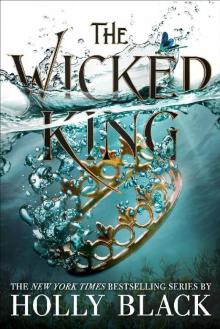 The Wicked King (The Folk of the Air #2)
The Wicked King (The Folk of the Air #2)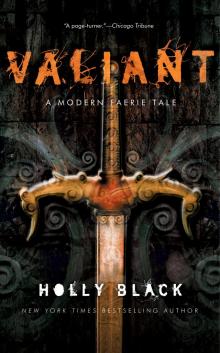 Valiant
Valiant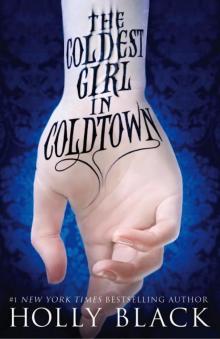 The Coldest Girl in Coldtown
The Coldest Girl in Coldtown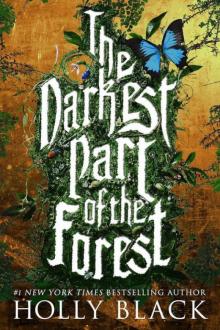 The Darkest Part of the Forest
The Darkest Part of the Forest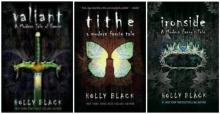 Tithe
Tithe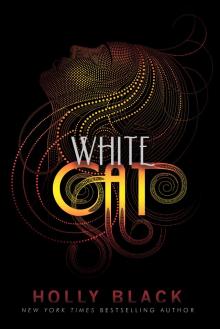 White Cat
White Cat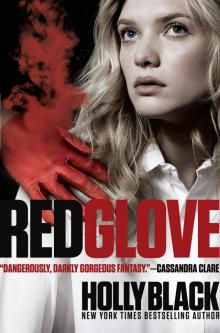 Red Glove
Red Glove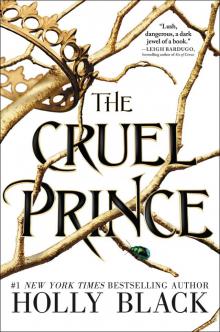 The Cruel Prince
The Cruel Prince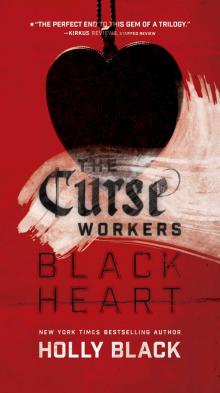 Black Heart
Black Heart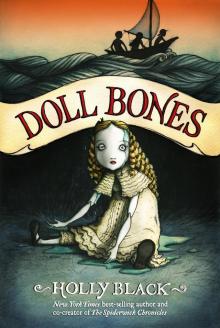 Doll Bones
Doll Bones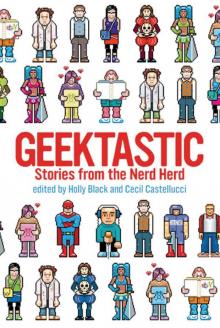 Geektastic: Stories from the Nerd Herd
Geektastic: Stories from the Nerd Herd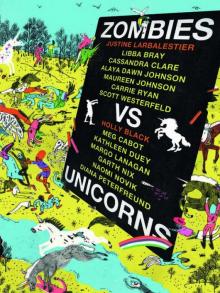 Zombies Vs. Unicorns
Zombies Vs. Unicorns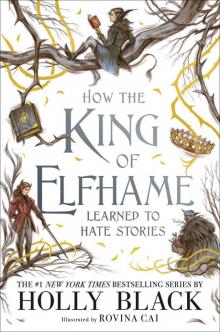 How the King of Elfhame Learned to Hate Stories
How the King of Elfhame Learned to Hate Stories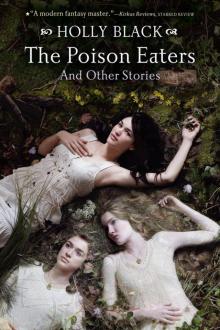 The Poison Eaters and Other Stories
The Poison Eaters and Other Stories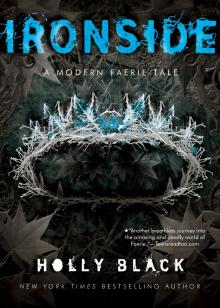 Ironside
Ironside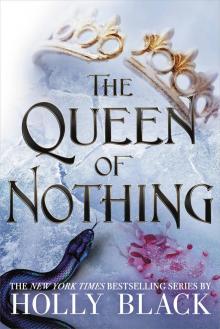 The Queen of Nothing
The Queen of Nothing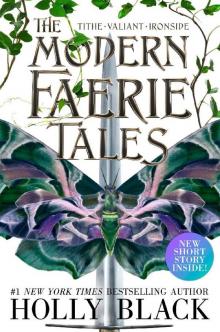 Modern Faerie Tales
Modern Faerie Tales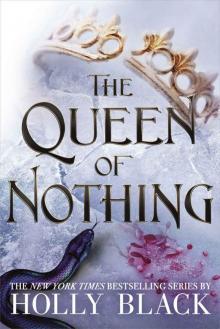 The Queen of Nothing (The Folk of the Air #3)
The Queen of Nothing (The Folk of the Air #3)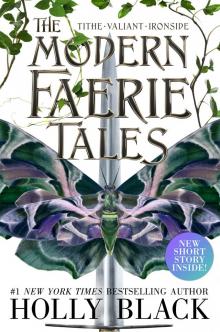 The Modern Faerie Tales
The Modern Faerie Tales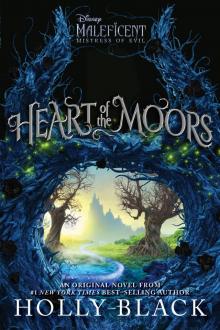 Heart of the Moors
Heart of the Moors The Golden Tower
The Golden Tower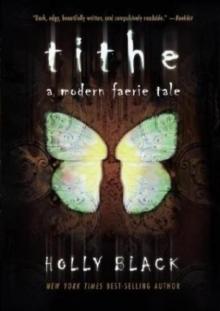 Tithe mtof-1
Tithe mtof-1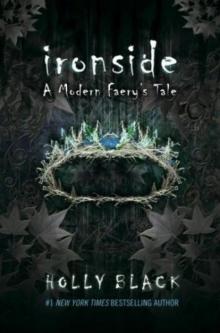 Ironside mtof-3
Ironside mtof-3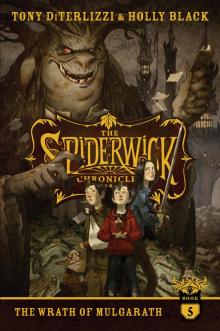 The Wrath of Mulgarath
The Wrath of Mulgarath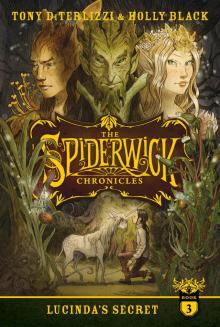 Lucinda's Secret
Lucinda's Secret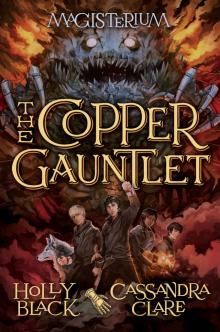 The Copper Gauntlet
The Copper Gauntlet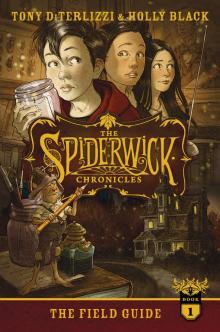 The Field Guide
The Field Guide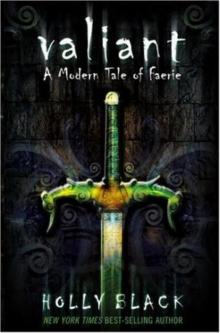 Valiant mtof-2
Valiant mtof-2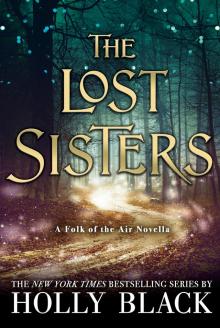 The Lost Sisters
The Lost Sisters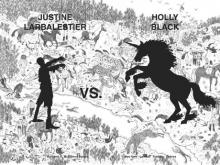 Zombies vs. Unicorns
Zombies vs. Unicorns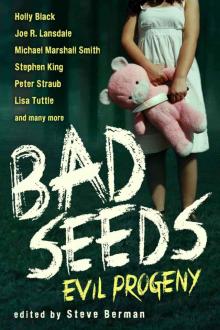 Bad Seeds: Evil Progeny
Bad Seeds: Evil Progeny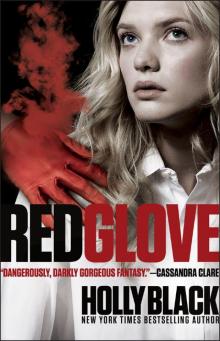 Red Glove (2)
Red Glove (2)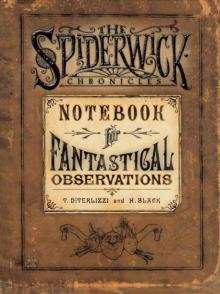 Notebook for Fantastical Observations
Notebook for Fantastical Observations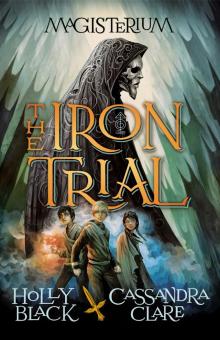 The Iron Trial
The Iron Trial Welcome to Bordertown
Welcome to Bordertown